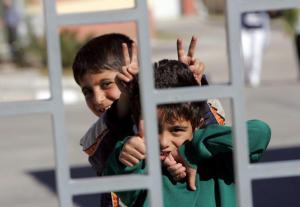
As the son of refugees, the subject of asylum seekers is close to my heart.
My parents, who experienced the Holocaust, Stalin’s Soviet Union and fighting at Stalingrad, came to Australia because it was the safest place they could find.
They weren’t queue jumpers. There was no queue. In 1950, Australia was quiet, insular and conservative. But it was safe, and that was all my parents cared about. They fell in love with the country because they found Australians were friendly.
My mother always talked about how she loved the way people would smile at her in the street. That was unheard of where she came from. Such a friendly country, she said, they took us in because we were outsiders.
This is why the Reclaim Australia rallies against asylum seekers, and the politicians who attend them, seem to be so un-Australian. At least through my refugee eyes. As are the policies discriminating against asylum seekers. As is a government that seeks to hide atrocities perpetrated at Manus Island and Nauru, Australia’s answer to Guantanamo Bay, from the world. Or a Prime Minister who calls a drowned Syrian toddler an illegal migrant.
The response to asylum seekers is rooted in a profound compartmentalisation where what’s moral and right, is separated off from the politically expedient.
John Howard’s immigration minister, Philip Ruddock, was a member of Amnesty International. And yet the same person was responsible for human rights violations and incarcerating asylum seekers without charge.
Amnesty International was critical of the policy of mandatory detention. Ruddock was blunt when asked how he could reconcile his actions as a minister and his membership of Amnesty International. He said he had waited 22 years to become a minister and he wasn’t going to waste that opportunity.
Scott Morrison is a devout Christian. Asked by journalists how he reconciled his faith with the incarceration of asylum seekers, he replied, “How I reconcile [my role] with my faith is, frankly, a matter for me”.
This is the compartmentalisation that stops political leaders from drawing a moral framework around asylum seekers. It creates a series of bewildering contradictions. The result: an asylum seeker policy that’s not moral but amoral.
What’s missing here is a moral framework that can hold the contradictions together. What’s needed is something that helps guide people to a resolution that could work politically without locking people up. A way to create a humane system that does not break people down mentally, incarcerate them in detention centres which are worse than jails, where children are sexually abused, guards give detainees marijuana in exchange for sex and asylum seekers stitch their lips shut in an act of protest.
.
A framework could be drawn using the nineteenth century concept of Utilitarianism and twentieth century definitions of human rights.
Utilitarianism was developed by John Stuart Mill and Jeremy Bentham. The model allowed legislators to decide on laws that were morally best. Theirs was a model that provided greatest balance of good over evil. .Legislators had to ask, who would be affected by each action, and examine what benefits and harms would be derived. They would have to choose which action would produce the greatest benefits and least harm. They would focus on society and the community, not on their prospects of being re-elected and holding on to power.
Our framework for asylum seekers can also draw on human rights. What makes humans, wherever they may be from, different from animals, is that they have a dignity. This dignity is based on our freedom to choose what we do with our lives. Central to this is a set of rights: the right to be told the truth–and be told about matters that would affect our choices, the right not to be injured and finally, the right to do whatever we wish in our personal lives without violating the rights of others.
It is quite clear that asylum seekers have not been treated well under either Utilitarianism or human rights; .Our lack of framework creates a gap between what’s morally right and politically expedience.
Incarceration without charge, denial of basic health care, sexual assault, other humiliations, as well as harm and traumatisation of children, are all occurring. I would argue this leaves a human just one step from death.
We must urgently apply a moral framework to allow a humane resolution to the problems. The framework would close the gap and give asylum seekers dignity.
The policies as they stand right now are unsustainable. Refugee numbers around the world are increasing. And in generations to come people will question how we lost our reputation as the safest place in the world for refugees and our capacity to welcome outsiders. And how we colluded with the moral vacuum.









